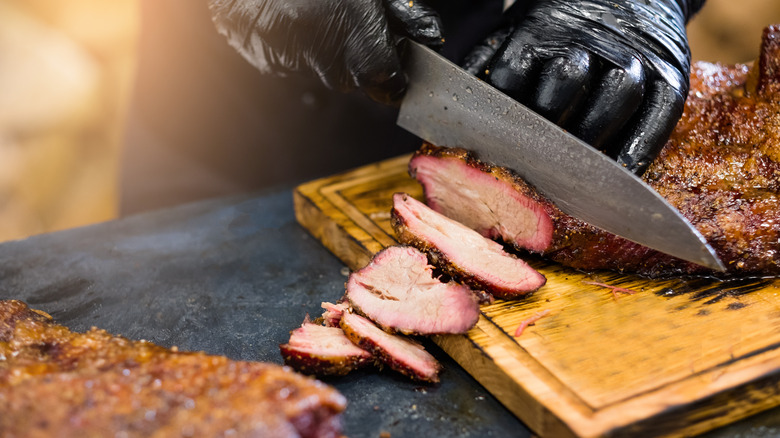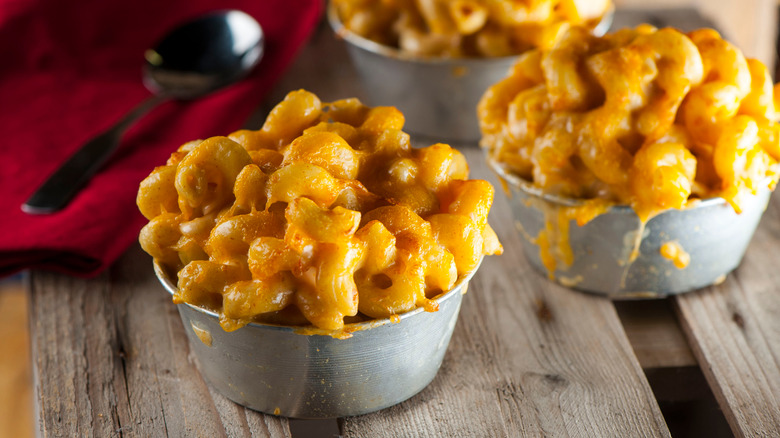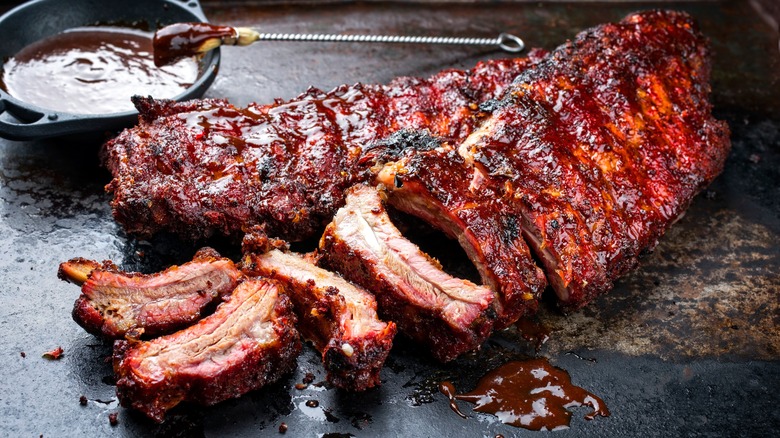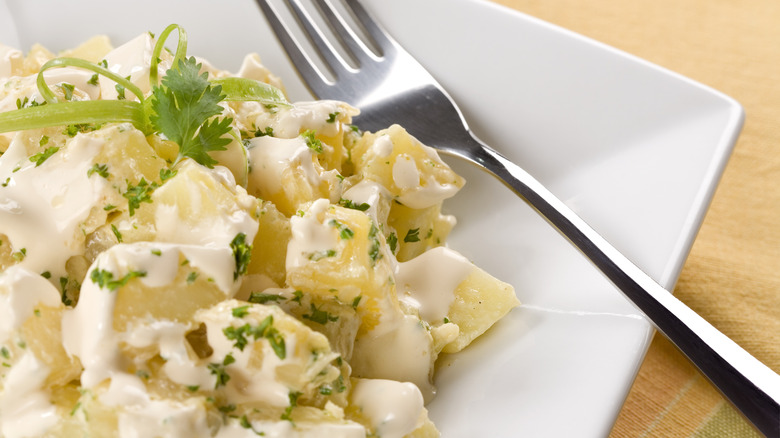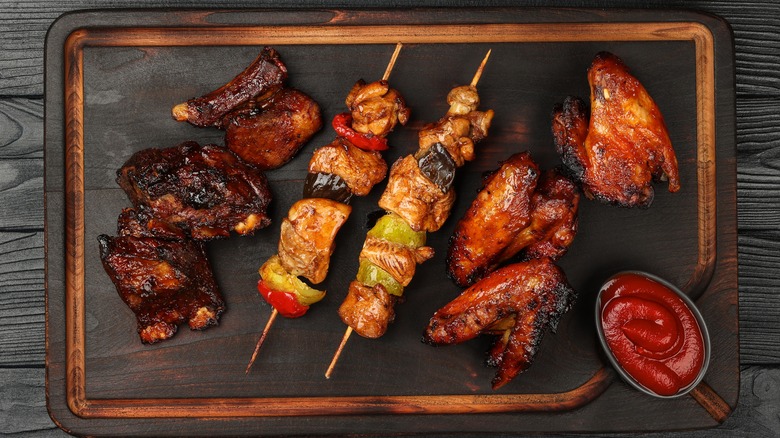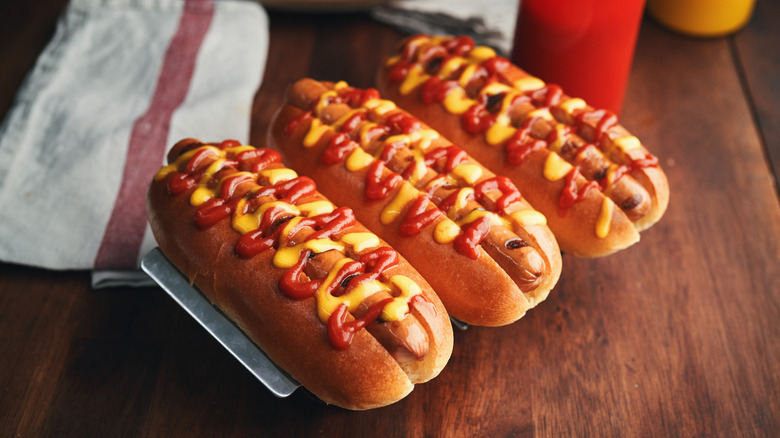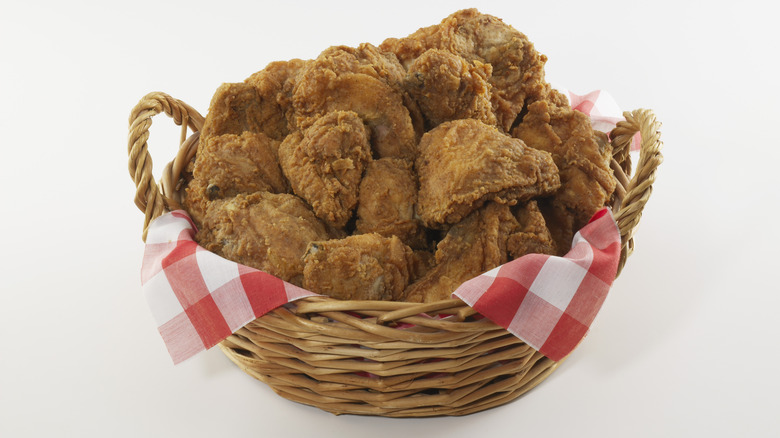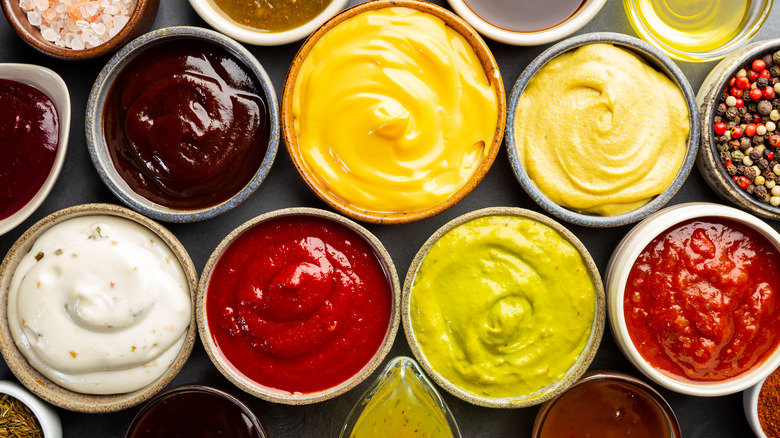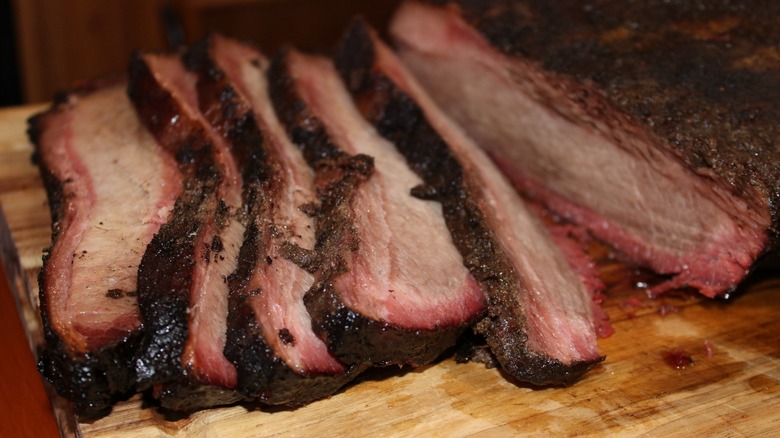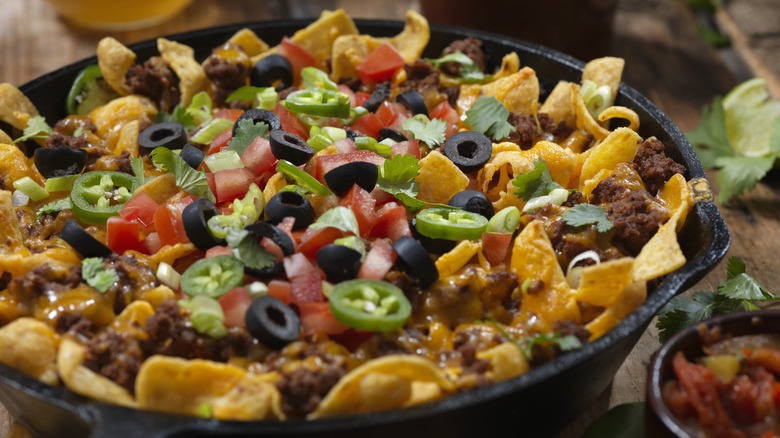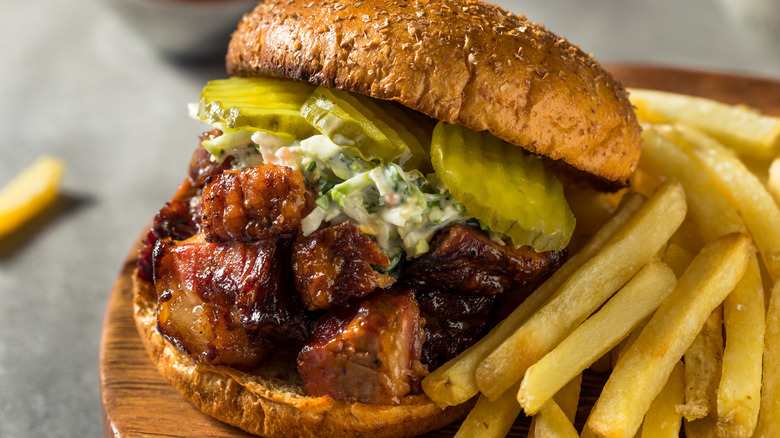11 Of The Unhealthiest Foods You Can Order At A Barbecue Restaurant
There's nothing quite like going out to a restaurant for barbecue. This style of cooking food has been popular in the U.S. for hundreds of years, originally coming to America by way of the Caribbean. That method for smoking meats was adopted and adapted by colonists and settlers, to eventually develop into the unique, complicated flavors of various types of barbecued meats popular today. These days, barbecue restaurant chains like Dickey's Barbecue Pit, Mission BBQ, Famous Dave's, and City Barbeque offer piles of meat, juicy burgers, and a cornucopia of sides to hungry customers.
But unfortunately, barbecue isn't exactly a healthy way of eating — and this shows in the nutritional values of some popular menu items. Barbecued foods can be burdened with high fat, sodium, and sugar contents, and contain high amounts of calories per serving. In this article, we determined our choices for what was unhealthy based on those nutritional values. Some of the most popular barbecue items can also be full of processed ingredients, and we've mentioned some of those, as well.
1. Macaroni and cheese
Let's be real: It's pretty rare for macaroni and cheese to be considered healthy. When it's made by a barbecue restaurant, you should be pretty careful. Commonly served as a side to meats, the mac and cheese served at barbecue places is typically full of fat, including saturated fat, and packs a big punch of calories for its serving size. For example, Mission BBQ's "Maggie's Mac-And-Cheese" side dish contains more than 300 calories per serving. That might not seem too bad until you consider that its serving size is 170 grams, which is close to the average apple.
Within that small size, 177 calories come from fat, and nearly 100 of those are pure saturated fat. Mission BBQ's macaroni and cheese appears to be more cheese than mac, too, with a mere 17 grams of carbs, and barely any fiber. But it's the saturated fat content that you should be aware of, because of its effects on cholesterol. Although a certain amount of saturated fat can be okay, consuming too much can cause increases in your LDL cholesterol (the type you don't want). This can increase your risk of developing a stroke or heart disease, reports the UK's National Health Service.
2. Spare ribs
Spare ribs are one of the most popular dishes at barbecue restaurants — and they're usually very unhealthy. Spare ribs rack up the calories, saturated fat, sodium, and sugar content fast. The largest portion size for Famous Dave's St. Louis-Style Spare Ribs is listed as 12 bones, which contains phenomenally large amounts of all of these. A 12-rib portion contains 1,910 calories, 51 grams of saturated fat, 35 grams of sugar, and almost 4,000 milligrams of sodium.
Pork spare ribs come from the pig's underside, which is a particularly fatty part of the animal. Any oils, glazes, rubs, or sauces used to cook spare ribs further raise the fat content, as well as the amount of sugar, sodium, and calories. Because spare ribs have premium flavor, it's easy to eat too many. Beware — excessive calorie consumption can lead to a range of issues. As well as causing weight gain and triggering indigestion, eating too many calories from foods high in fat, sugar, and salt can disrupt your body's ability to assess when you're satisfied after eating, according to Healthline.
3. Potato salad
Potato salad is a classic side dish at a lot of barbecue joints, and it's easy to understand why. The creamy, slightly tangy taste can be the perfect counterbalance to the bolder, sharper, smoky flavors of barbecued meats. Just don't expect potato salad to be a healthy choice. Creamy salads like potato salad use a lot of mayonnaise, which makes up the bulk of the dressing. Mayonnaise is both calorie- and fat-dense, with 1 ounce of mayonnaise containing more than 200 calories and 22 grams of fat. One ⅔-cup serving of potato salad at City Barbeque comes in at 450 calories and 30 grams of fat.
If you're looking for a more health-conscious choice, consider a regular baked potato or a green or bean salad. Untopped baked potatoes allow you to control the amount of fat you add to them, whereas green and bean salads provide you with important nutrients and fiber.
4. Combo platters
At barbecue restaurants, ordering a combo platter gives you the chance to sample a variety of meats and side dishes, and pretty much guarantees you leave feeling sated and satisfied.
Unfortunately, though, combo platters tend to come with massive portions of fat-laden, salty, calorific foods. Take Joe's Kansas City Barbecue Hogamaniac plate, a combo of sausage, ribs, pulled pork, a side dish, and Texas toast. Registered dietitian nutritionist Mary Sabat considers the Hogamaniac to be the most unhealthy choice on Joe's menu, Eat This, Not That reports. Sabat noted the "substantial amount of meat" that comes with the platter, the "high levels of butter or oil" in the Texas toast, and that "many barbecue sides are laden with sugars, sodium, and additional unhealthy fats."
"This meal's overall composition is a recipe for excessive calorie and fat intake, potentially contributing to weight gain, heart disease, and other health issues when consumed regularly," Sabat said.
Order a Sonny's Sampler from Sonny's BBQ and you'll be served brisket, ribs, barbecue chicken, pulled pork, a side dish, and bread — and more than 1,900 calories, 111 grams of fat, and almost 3,000 milligrams of sodium. The Food and Drug Administration recommends consuming less than 2,300 milligrams of sodium in an entire day.
5. Hot dogs
Hot dogs are a classic barbecue food and one that both adults and kids seem to enjoy in equal measure. But just because they're not dripping in marinades or visible fat, doesn't mean they're a healthy choice. The typical plain beef hot dog on a bun has more than 300 calories, 18 grams of fat, and 810 milligrams of sodium. That's without any condiments or toppings. Highly processed meats like hot dogs are considered detrimental to good health if eaten regularly. Processed meats contain nitrates as preservatives, which are harmful to the digestive tract; excessive consumption of processed meats has been linked to higher rates of bowel cancer, per Cancer Research.
It's also worth bearing in mind that while hot dogs may be smaller than the average steak or rack of ribs, they can quickly be made more calorific and sodium-packed with the addition of toppings. Cheese, grilled onions, chili, condiments, and sauces will impact your hot dog's nutritional aspects in ways that are not usually beneficial to your health. And the whole affair is usually enclosed in a white bun made of refined, low-fiber flour, which ranks pretty poorly, nutritionally speaking.
6. Fried chicken
Many barbecue restaurants serve fried chicken, a solid choice for folks who don't want to consume a lot of red meat. But fried chicken comes with its own nutritional issues. Rarely a healthy choice regardless of the setting, the fried chicken served in many barbecue establishments can be particularly unhealthy, with single pieces having hundreds of calories and high amounts of saturated fat.
The cooking process for fried chicken, which involves dredging pieces in a salty coating and then plunging them into hot oil, seriously contributes to the unhealthiness of the dish. At Bill Miller Bar-B-Q, one fried chicken wing has 330 calories, 19 grams of fat, and 5 grams of saturated fat. A fried chicken thigh has 320 calories, 22 grams of fat, and 9 grams of saturated fat. Eat one wing and one thigh, and you've consumed more than the 13 grams of saturated fat the American Heart Association recommends you have in one day. Even a fried chicken breast, which is leaner white meat, has 330 calories, 19 grams of fat, and 5 grams of saturated fat at Bill Miller.
And you're probably not going to be eating that chicken on its own. Bill Miller's 4-piece chicken tenders meal, with fries, gravy, and a roll, comes in at 1,400 calories, 69 grams of fat, 22 grams of saturated fat, and 3,260 milligrams of sodium.
7. Dips and sauces
Unless you prefer to eat french fries dry or are okay with barbecued meat that is inadequately sauced, you're likely going to want extra dips and sauces when dining at a barbecue joint. But just because sauces are often served in smaller portions, doesn't mean their calorie counts are smaller, too. Dips and sauces in barbecue restaurants are nearly always high in fat, sugar, and sodium, which can significantly increase the amounts of all of these in your meal without you even realizing it.
Mission BBQ's Alabama White Sauce, for instance, is served in 28-gram portions. In those 28 grams are 161 calories, with 155 of them coming straight from the 17 grams of fat in the sauce. Although a lot of this fat is polyunsaturated — one of the healthier kinds– it's still a large amount of fat in a small serving, and adds little by way of other nutrients. Mission BBQ's Gator Bite BBQ Sauce has a lower calorie count, at 93 calories per serving, but has almost 700 milligrams of sodium and 20 grams of sugar. That's almost ⅓ of the Food and Drug Administration's recommended daily value of 2,300 milligrams of sodium, in a few tablespoons of sauce.
8. Brisket
Brisket is a star attraction on many barbecue restaurant menus, especially in eateries specializing in Texas-style barbecue. A mountainous pile of slow-smoked, soft-as-butter meat might be your thing, but you might want to keep its nutritional impact in mind. Brisket is a fairly fatty cut of meat, and while this fat is what makes it so moist and tender, it's also largely unhealthy, saturated fat. If you're ordering a single portion of smoked beef brisket from Dickey's Barbecue Pit, you can expect 13 grams of saturated fat, approximately 64% of the recommended daily value.
As well as this: Barbecue joints tend to smother their brisket in seasonings and sauces, which pair excellently with the inherent fattiness of the meat — but make it less nutritious. At Dickey's, a serving has slightly more than 650 milligrams of sodium, and that's in the meat alone, sans any sauce. It's also useful to remember that brisket is fairly high in cholesterol, too, with 116 milligrams in each serving at Dickey's. This may pose a risk to folks who are sensitive to consuming cholesterol in their diets, per Healthline.
9. Cheeseburgers
If you're not sure what to order at a barbecue restaurant, the cheeseburger is usually a dependable choice. But they're far from healthy. It's no surprise that cheeseburgers are high-fat options, partially thanks to the cheese, which also contributes to calorie and sodium levels. Because barbecue places often add barbecue-specific extras to their cheeseburgers such as pulled pork with barbecue sauce, the calorie, fat, and sodium levels go correspondingly higher.
Famous Dave's Ultimate Burger is a particularly clear example of this. Nestled inside its dessert-sweet brioche bun, the burger manages to pack in 1,240 calories, 32 grams of saturated fat, and almost 3,200 milligrams of sodium, thanks to its burger patty being topped with cheese, bacon, chopped pork, and barbecue sauce. Although none of this burger's nutritional numbers are encouraging, the sodium is especially worrying. Too much sodium can increase the strain on your cardiovascular system and lead to blood vessels becoming increasingly inflexible, which then heightens the risk of serious cardiovascular disease, according to the Harvard T. H. Chan School of Public Health. And again, these numbers do not include any side dishes or additional add-ons, so keep that in mind.
10. Frito pie
You might not find a Frito pie in every barbecue restaurant you go to, but we can understand why you'd want to try it if you see it. This uniquely Southwestern recipe is sort of like a barbecue-infused take on nachos, with corn chips serving as a base upon which chili, shredded cheese, and a host of toppings are piled.
Homemade Frito pie is usually a pretty casual affair that's mixed in and served straight from the bag. Barbecue restaurants' Frito pies, like Dickey's Barbecue Pit's Frito Pie Stack, are often a plate of corn chips topped with a tower of brisket, barbecue beans, and shredded cheese. And it's pretty unhealthy. The per-serving calorie count of Dickey's Fritos Pie Stack comes in at 1,085, with fat at 52.5 grams, saturated fat at 15.5 grams, and sodium at 2,236 milligrams.
The brisket and the corn chips supply high levels of fat, with the chips also containing unhealthy trans fats. And while the barbecue beans may initially seem healthy, their high levels of added sugar explain the sweetness of the dish. Additionally, it's useful to keep in mind how you're eating this option. If, like nachos, you're splitting a Frito pie with friends as an appetizer, you could be adding high levels of unhealthy nutrients to your meal before you even start in on your main course.
11. Burnt ends sandwiches
Burnt ends sandwiches can represent the best of two worlds in a barbecue restaurant, simultaneously satisfying your craving for a sandwich while providing deeply intense barbecue flavor. But they can also often break the bank, nutritionally speaking. Smoked nuggets of brisket known as burnt ends are tender pieces of fatty, salty meat that tend to be drenched in barbecue sauce, which adds sugar and more sodium. Burnt ends sandwiches are often topped with a generous amount of cole slaw and/or cheese, further spiking their fat and sodium content.
In the burnt ends sandwich at Dickey's Barbecue Pit, this all adds up to a pretty unhealthy sandwich. In just the sandwich alone, there are 654 calories, with 331 calories coming from the 37 grams of total fat (14 grams of that is saturated fat) in its burnt ends, cheddar cheese, dill pickles, and barbecue sauce, piled on a brioche bun. The use of a brioche bun also contributes more to those dismal numbers than you might think for such a sweet-tasting bread. And as a white flour bun, it contains only a single gram of fiber.
